To identify and handle a plumbing emergency in Forest Park, watch for signs like sudden drop in water pressure, leaky faucets, or water pooling. In case of burst pipes or severe clogs, turn off the main water valve immediately. Use a plunger or snake to clear drains, and have towels ready for spills. Be alert to situations requiring a professional plumber, especially for persistent leaks or sewage backups. Investigate more steps to manage emergencies effectively.
Key Takeaways
- Look for signs like sudden water pressure drops, leaky faucets, or water pooling to identify plumbing emergencies early.
- Immediately shut off the main water valve to prevent further damage before addressing the issue.
- Use a plunger or plumber's snake for minor blockages; keep towels handy for spills.
- Call a professional plumber if leaks persist, sewage backs up, or you lack hot water for safety.
- Schedule regular maintenance checks and familiarize yourself with shut-off valve locations to prevent future emergencies.
Common Signs of a Plumbing Emergency
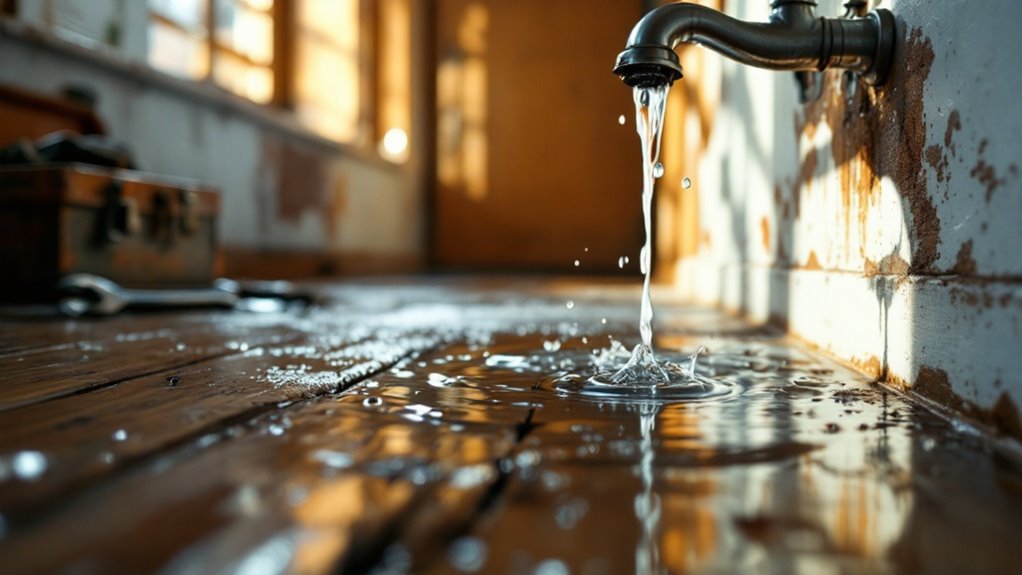
How can you tell if you're facing a plumbing emergency? One clear sign is a sudden drop in water pressure throughout your home. If you notice weak streams from your faucets, it could indicate a serious issue. Furthermore, pay attention to leaky faucets; even minor drips can signal underlying problems. Check for water pooling under sinks or around your water heater. If you observe any unusual sounds, like gurgling or hissing, that's another red flag. Finally, be aware of any unexplained increases in your water bill, as this could point to hidden leaks. Trust your instincts—if something feels off, it's better to act quickly and consult a professional to prevent further damage. Remember, immediate action is crucial for preventing damage and costly repairs.
Types of Plumbing Emergencies
When facing a plumbing emergency, it's essential to identify the type of issue at hand. Burst pipes can lead to significant water damage, while severe drain clogs can disrupt daily activities and cause backups. Understanding these situations will help you respond effectively and minimize damage. Additionally, recognizing common plumbing emergencies can aid in determining the urgency of the situation.
Burst Pipes Situations
While burst pipes are often unexpected, knowing how to respond quickly can minimize damage and restore your home's plumbing system. Common burst pipe causes include freezing temperatures, high water pressure, and corrosion. To prevent these situations, verify your pipes are insulated during winter and regularly check for wear and tear.
If you find a burst pipe, immediately turn off your water supply to halt the flow. Next, drain your faucets to relieve pressure and avoid further issues. Document the damage for insurance purposes and contact a professional plumber to assess and repair the situation. Remember, a proactive approach to burst pipe prevention can save you time, money, and stress in the long run. Stay vigilant and keep your plumbing system in check.
Severe Drain Clogs
Severe drain clogs can lead to significant plumbing emergencies, disrupting your daily routine and causing water damage if not addressed promptly. Identifying the cause of a clog is essential for effective drain cleaning and preventing future issues. Below is a table showcasing common types of clogs and solutions.
| Type of Clog | Cause | Solution |
|---|---|---|
| Hair Clogs | Human hair | Drain cleaning |
| Grease Build-Up | Kitchen waste | Hot water flush |
| Foreign Objects | Improper disposal | Manual removal |
| Tree Roots | Root intrusion | Root removal |
| Soap Scum | Soap residue | Enzymatic cleaners |
Immediate Actions to Take
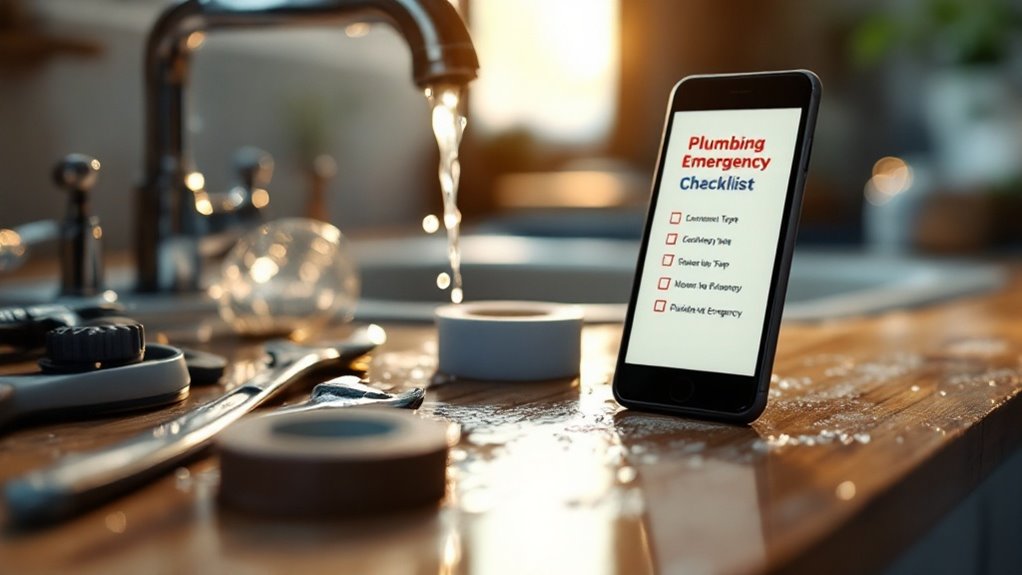
If you find yourself facing a plumbing emergency, swift action is vital to minimize damage and restore normalcy. First, confirm your emergency preparedness plan includes locating the main water shut-off valve and turning it off to prevent further flooding. Next, identify the source of the problem; for instance, a leaky pipe may require temporary sealing with duct tape as a quick fix. If it's a blocked drain, try using a plunger or a plumber's snake to ease the blockage. As you work, keep towels handy to soak up any spills. Document the situation with photos for future reference. These immediate steps can make a significant difference, guaranteeing your home remains protected while you consider your next course of action.
When to Call a Professional Plumber
How can you tell when it's time to call a professional plumber? If you encounter persistent leaks, significant water damage, or sewage backups, it's essential to seek expert assistance. These scenarios require immediate emergency response, as they can escalate quickly.
Here's a quick reference:
| Signs to Call a Plumber | Importance of Professional Help |
|---|---|
| Persistent leaks | Prevents further water damage |
| Sewage backup | Protects health and hygiene |
| No hot water | Guarantees comfort and safety |
A licensed plumber's qualifications guarantee they can accurately diagnose and resolve these issues. Don't hesitate—your home's integrity and safety are at stake. Trust the professionals when in doubt.
Preventative Measures to Avoid Emergencies
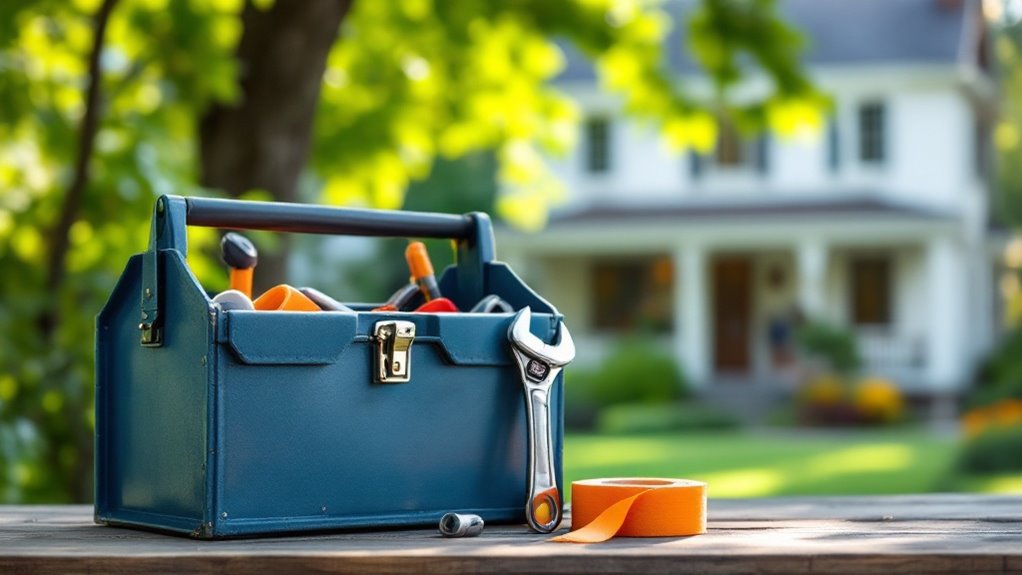
While plumbing emergencies can strike unexpectedly, implementing preventative measures can greatly reduce your risk. Start with regular maintenance; checking for leaks, clogs, and worn-out fixtures can save you from bigger issues down the line. Don't wait until a problem arises—schedule seasonal inspections to guarantee your plumbing system operates at its best. During these inspections, professionals can identify potential hazards before they escalate. Furthermore, be mindful of what goes down your drains; avoid flushing non-biodegradable items or grease. Finally, familiarize yourself with your home's shut-off valves; knowing where they are can save precious time in an emergency. By taking these proactive steps, you'll not only protect your home but likewise gain peace of mind.
Understanding Your Home's Plumbing System
Understanding your home's plumbing system is essential for effective maintenance and quick response during emergencies. Familiarizing yourself with your pipe layout and water pressure helps you identify potential issues before they escalate.
Here's a simple overview of your plumbing components:
| Component | Function |
|---|---|
| Supply Pipes | Deliver clean water to fixtures |
| Drainage Pipes | Remove waste and wastewater |
| Valves | Regulate water flow and pressure |
Knowing the layout of your pipes allows you to locate shut-off valves swiftly, which is important during a plumbing emergency. Moreover, understanding your water pressure can help you troubleshoot leaks or clogs more effectively. Empower yourself with this knowledge for peace of mind.
Essential Tools for Plumbing Repairs
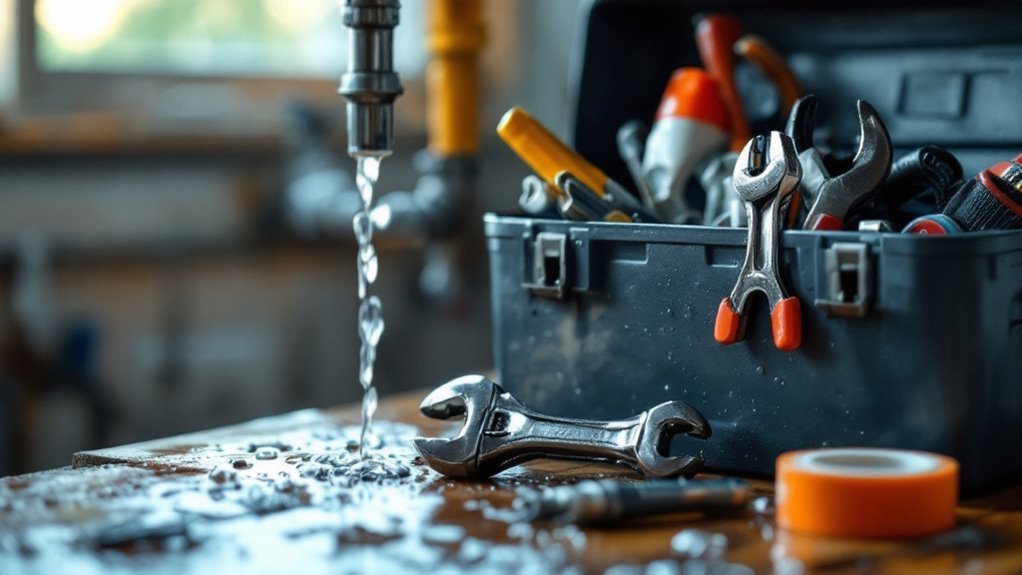
Familiarity with your plumbing system not only prepares you for emergencies but likewise helps you gather the right tools for effective repairs. Start by assembling crucial plumbing tools including a pipe wrench, adjustable pliers, and a plumber's snake. A high-quality repair kit, complete with assorted washers, seals, and plumber's tape, is invaluable for quick fixes. Don't forget a bucket to catch any leaks and rags for cleanup. A flashlight can be a lifesaver when working in dim areas. By having these tools on hand, you'll be ready to tackle minor issues before they escalate into costly repairs. Remember, being proactive with your plumbing tools can save you time, stress, and money in the long run.
Dealing With Insurance and Claims
When a plumbing emergency strikes, managing insurance and claims can feel overwhelming, but knowing how to approach the process can ease some of that stress. Start by reviewing your insurance coverage to confirm what's included for plumbing-related damage. Then, follow these steps to navigate the claim process smoothly:
- Document the damage with photos and notes.
- Notify your insurance company promptly to initiate the claim.
- Provide all necessary information, including repair estimates and invoices.
- Keep communication lines open with your insurer for updates.
Maintaining a Good Relationship With Your Plumber
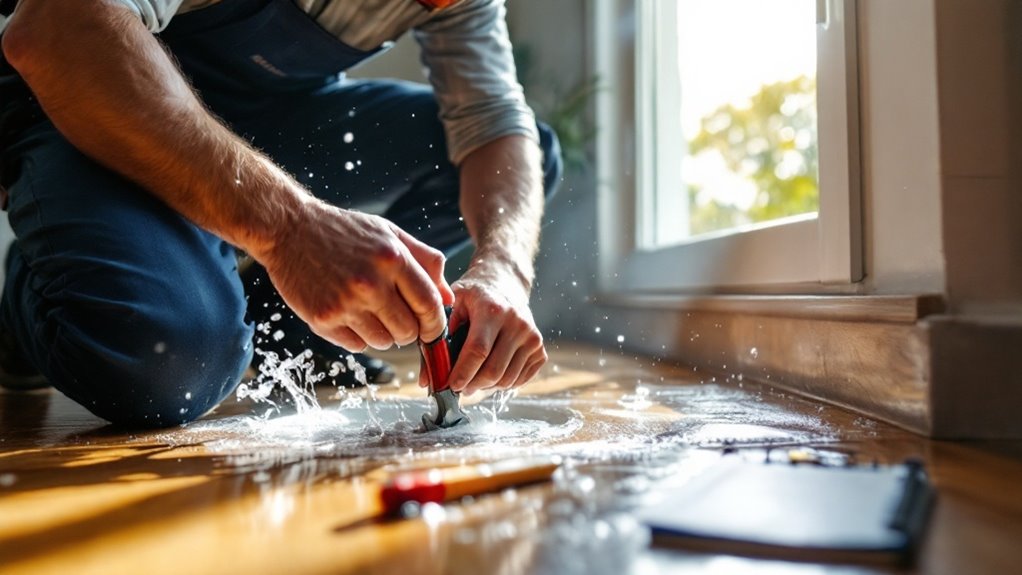
A strong relationship with your plumber can greatly improve the efficiency and effectiveness of any plumbing service you require. To cultivate this connection, focus on effective communication strategies and trust building.
| Communication Strategies | Trust Building | Benefits |
|---|---|---|
| Be clear about issues | Show reliability | Faster response times |
| Ask questions | Follow through on promises | Quality workmanship |
| Provide feedback | Respect their expertise | Long-term relationship |
Frequently Asked Questions
What Are the Costs Associated With Plumbing Emergencies?
Emergency costs for plumbing issues can vary widely, influenced by severity and time of service. Check your insurance coverage; some policies may help offset these unexpected expenses, providing you peace of mind during stressful situations.
How Can I Find a Reliable Plumber in Forest Park?
Did you know that 78% of homeowners prioritize plumbing credentials when hiring? To find a reliable plumber in Forest Park, check their credentials and read customer reviews to guarantee you're making a well-informed decision.
Are DIY Repairs Safe for Plumbing Emergencies?
DIY repairs can be risky during plumbing emergencies. If you've got the right plumbing tools and emergency supplies, you might manage minor issues, but it's often safer to call a professional for complex problems.
What Should I Do if My Plumber Is Unresponsive?
If your plumber's unresponsive, reach out to your emergency contact for urgent assistance. Consider plumber alternatives, like local services or referrals, ensuring you have reliable support during this frustrating time. Don't hesitate to seek help.
How Can I Prevent Plumbing Emergencies During Winter?
To prevent plumbing emergencies in winter, you need to focus on winter preparation. Insulate your pipes effectively, check for drafts, and let faucets drip during extreme cold to avoid freezing. A proactive approach makes all the difference.
